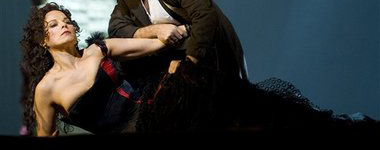Via Metropolitan Opera ED Broadcast
By Angela Rocco DeCarlo, copyright, 2010
There is one more opportunity to experience the thrill of the Metropolitan Opera’s production of George Bizet’s incendiary entertainment, “Carmen,” in a repeat broadcast to movie houses around the world, Wednesday, February 3, 2010, 6:30 p.m. local time.
I saw the show in my neighborhood movie theater, Saturday, January 16, 2010, and would have sat through another performance immediately. This presentation is marvelously entertaining with behind-the-scenes interviews and other sidebars at the Metropolitan Opera house.
“Carmen,” is one of a handful (others are “Tosca,” “Butterfly,” and “Traviata”) of perfect operas for those who have not yet seen an opera, but think they should. It has everything: iconic characters, memorable music and explosive passions. No novice will be disappointed in this show.
Pity Georges Bizet, composer of this blockbuster opera, fourth on the opera “hit parade” of the 20 most performed. He was hoping for success with the debut of “Carmen” at the Opera Comique, Paris, March 3, 1875, but audiences were flummoxed by the departure from the usual shows at that venue and completely rejected the opera. It closed soon after opening and sadly Bizet died, at age 37, shortly thereafter, never knowing he had created one of the most successful and enduring operas ever written.
Thanks to liberal use of Bizet’s fiery music in popular culture, even those who never sat in an opera house have a humming acquaintance with Bizet’s exuberant creations for “Carmen” – the "Habanera"; the "Toreador" aria; the "Sequidilla" and more. The librettists, Henri Meilac and Ludovic Halévy, based their work upon the 1845 Prosper Mérimée’s novella of the same name. Their tautly focused script allows even a newcomer to grasp the subtle points of the characters, social references and the logical action of the opera.
As is the fashion these days, the production tinkers with the opera’s time setting, “updating” the scenes from early 19th century to the early 20th century Spanish Civil War. Fortunately, the costume changes make little difference, as the main characters are gypsies and soldiers – their attire remains as expected.
The story takes place in the 2,000 year-old Roman city of Seville, Spain, focusing on the tensions of gypsy women workers in the government monopoly cigarette factory and the military men, presumably guarding the crown’s interests. The soldiers are depicted as uniformed vultures eyeing their prey –the sultry gypsies. The most beautiful of the women is Carmen - Carmenita, as she tells the men. Played by extraordinary mezzo soprano, Elina Garanca, Carmen is nearly masculine in her swagger of independence, yet certain of her dazzling feminine allure. She infuses the character with something more than mere sex. Garanca’s Carmen has gravitas in her insistence on living without restraints, no matter the consequences. Clearly, she is the “general” among the army men with only her beauty and promise of love as her authority.
The story is simple, – Carmen sets her sights and a flower on Corporal Don Jose, sung by tenor, Roberto Alagna, the only soldier who pays her no attention, preferring his finance, sweet Micaela, (Barbara Frittoli), who has delivered a message from Jose’s mother. Despite maternal concern, Jose’s fate is sealed. Too soon, love for Carmen destroys his career, his honor and more. Of course, elitist Lieutenant Zuniga, (Keith Miller) Jose’s commanding officer, thinks Carmen should be his; officers’ privilege. A ruckus among the cigarette women lands Carmen in trouble, but Jose, quickly under her spell, allows her to escape jail, with disastrous results for him.
The opera, sung in French with English supertitles, is in four acts, runs about three and one half hours, and has one intermission, As is traditional with French operas there is plenty of dance, including two pas a duex before the opening curtains, depicting the lovers’ happiness. That's a brilliant touch, as happiness is mostly absent within the story.
The action moves quickly from the opening scenes to a barroom gypsy dance and the electrifying entrance of matador Escamillo, the epitome of manly perfection. Played by Teddy Tadu Rhodes, a 6’5’ baritone, Spain's cultural star trails women into the tavern like so many kite tails. He, too, falls in love with Carmen and the rest of the story does not go well for poor soldier Don Jose.
We’ll leave the plot unrevealed for those who wish to experience it for themselves. However, it’s no surprise Jose ends up with Carmen and her outlaw friends as they plan smuggling operations in the mountains outside Seville. While it is never stated what the smuggled goods are, with the Spanish Crown’s tobacco monopoly, established in 1637, it’s not much of a mystery that cigarette workers are involved.
Roberto Alagna’s Jose is a marvelous match for Elina Garanca’s Carmen. While Carmen is overtly dynamic, Jose’s character only catches fire when ignited by Carmen’s passions. Supporting actors, smugglers Elizabeth Caballero, Sandra Piques Eddy, Earle Patriarco and Keith Jameson do not fade into stock figures, but are individuals with beautiful voices and particular personalities which add color and energy to the action. Conductor Yannick Nezef-Seguin moved the orchestra to match the passions seen on stage, in this enthralling production by Richard Eyre.
In the final act, the noisy crowds outside the bullring, relish seeing the country’s heroes, matadors, as they make their grand approach and entrance into the arena They are arrayed in the most colorful and beautiful costumes seen in the show. Their whip-thin bodies encased in sparkling satins, they command the cynosure their courage demands. It is a telling scene which speaks to the perennial human desire to create and adore superheros appropriate to the culture. Escamillo controls his image and accepts the worship. His character is a worthy consort to now-regal Carmen, which contrasts to poor Jose’s tragic loss of dignity and honor for the sake of lust.
The final scene, inside the bullring, was lost on the audience in my theater as the lighting was so dim it was impossible to discern details. This has been an on-going problem with the MetHD broadcasts - very dark stages with loss of visuals of supporting actors.
Bizet's "Carmen" is a timeless story of passion, a tale of a female Don Juan, told with gorgeous music and superlative talent. Anyone who attends the next Met broadcast will count themselves fortunate to have seen this production.
###
For information: http://www.metroperafamily.org/HDLive
Angela Rocco DeCarlo, copyright 2010.
Angela Rocco DeCarlo, is a veteran journalist, covering travel, culture and entertainment, originally in Chicago, currently based in Southern California. She served as an opera docent for nearly 20 years with the late Opera Pacific, Santa Ana, CA.



No comments:
Post a Comment